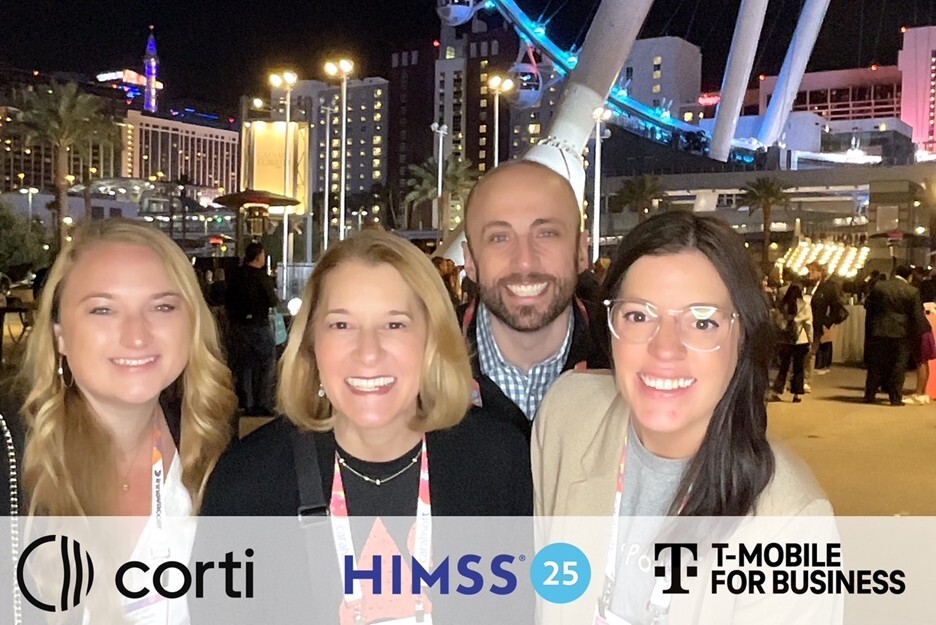Exploring AI and Data Security at HIMSS 2025: Key Takeaways in Las Vegas

With the backdrop of slot machines whirring and ringing at the Healthcare Information and Management Systems Society (HIMSS) 2025 conference in Las Vegas, the event was a smorgasbord of booths, education sessions, keynotes, and meet-and-greets around innovation and transformation in healthcare technology. For me, two topics stood out from the rest: artificial intelligence (AI) and data security. These are two critical elements that continue to shape the future of healthcare, and HIMSS 2025 highlighted how AI and data security are evolving, their impact on health systems, and the challenges they bring.
AI in Healthcare: Transforming Care Delivery
From booth displays to panel discussions, AI was everywhere at HIMSS 2025. AI has arrived and is here to stay! One key theme was the role AI plays in streamlining clinical decision-making and improving patient outcomes. Numerous sessions discussed AI’s ability to support physicians by providing more accurate diagnostics, personalized treatment plans, and even predicting patient outcomes. Experts explored how AI-powered tools are analyzing medical images with remarkable precision, identifying cancer diagnoses earlier and with greater accuracy, reducing human error related to medication dispensation, and increasing speed in diagnosis decision-making.

In addition to clinical applications, AI’s potential to enhance operational efficiencies was on full display. From predicting patient no-shows, optimizing staff allocation, using robots to explain diagnoses to patients, to managing common health system logistical hurdles. The conversations around AI’s application in administrative roles emphasized the immense potential for AI to reduce costs and improve workflows.
Data Security: Safeguarding the Future of Healthcare
Alongside the excitement around AI, data security was a critical area of focus at HIMSS 2025. With AI and other technologies driving more data generation and sharing than ever before, securing sensitive patient information, monitoring access and permissions, and governing what data should be restricted, archived, and retained for compliance and audit purposes have become even more crucial as they are complex.
Another important topic of discussion centered on the need for a multi-layered approach to cybersecurity. With cyberattacks becoming more sophisticated and the experience from the Change Healthcare breach, healthcare systems must adopt more advanced solutions to protect patient data and the integrity of collaboration platforms like Microsoft 365 and Google Workspace. Robust backup and recovery and comprehensive data governance are essential for cleaning up and monitoring unstructured data, and systems are needed to help assess and identify vulnerabilities and threats to keep breaches at bay.

In addition, a major concern was the growing risks associated with data sharing and interoperability. As more healthcare data is shared across different platforms and systems, the possibility of a data breach increases. Solutions to enhance the security of data sharing were explored, such as blockchain technology and advanced authentication methods. The consensus was clear: While interconnected healthcare systems offer immense benefits, they inevitably create complex security challenges that need to be addressed with urgency, vigilance, and innovation.
The Intersection of AI and Data Security
As AI becomes more integrated into healthcare systems, it brings with it both opportunities and risks. AI can help identify vulnerabilities in healthcare systems, enhancing threat detection capabilities, and even automating the response to security incidents.
HIMSS 2025 provided healthcare systems a timely reminder to take steps to understand their current level of exposure, especially with unstructured data, and leverage technology to automate, monitor, and address potential risks by using clinical and operational solutions that AI-powered tools have to offer.

Key Takeaways
Aside from wearing comfortable shoes whenever in Vegas, here are a few key takeaways from HIMSS 2025:
- AI is revolutionizing healthcare. From diagnostics to administrative tasks, AI is reshaping how care is delivered and how healthcare systems operate. The potential to improve patient outcomes and streamline operations is transformative.
- Data security remains a top priority. As AI and other technologies generate more data, protecting sensitive data becomes even more critical. Healthcare organizations must implement robust data security measures to protect patient and business information and ensure that their digital environments have strong defenses against cyberattacks.
AI and security must work hand-in-hand. Technological advancements in AI must be geared toward driving innovation in healthcare and enhancing cybersecurity efforts. Knowing where vulnerabilities exist and addressing them in a systemic and proactive way can help organizations to realize the benefits of AI tools while minimizing the risks.

Patty Riskind leads the healthcare/life science go-to-market strategy at AvePoint. She has 30 years of experience working with healthcare providers, payers, pharma, and medtech organizations driving innovation and exponential growth. Her mission is to leverage technology, data, and human-centered design to support more accessible, equitable, and effective healthcare experiences.



